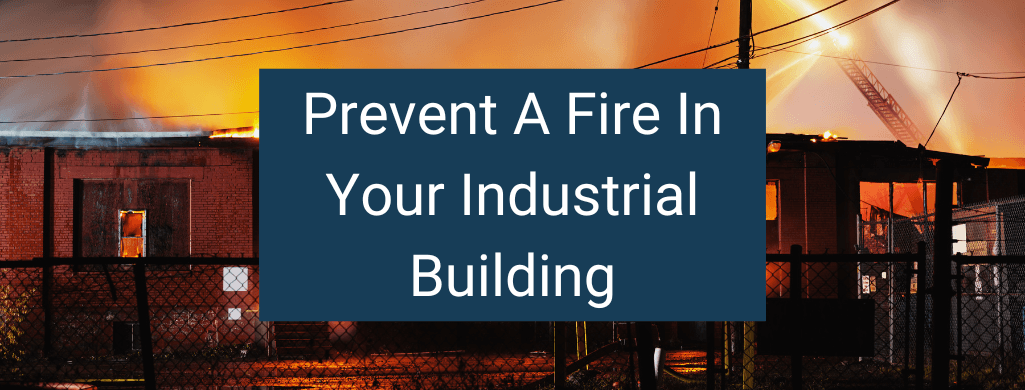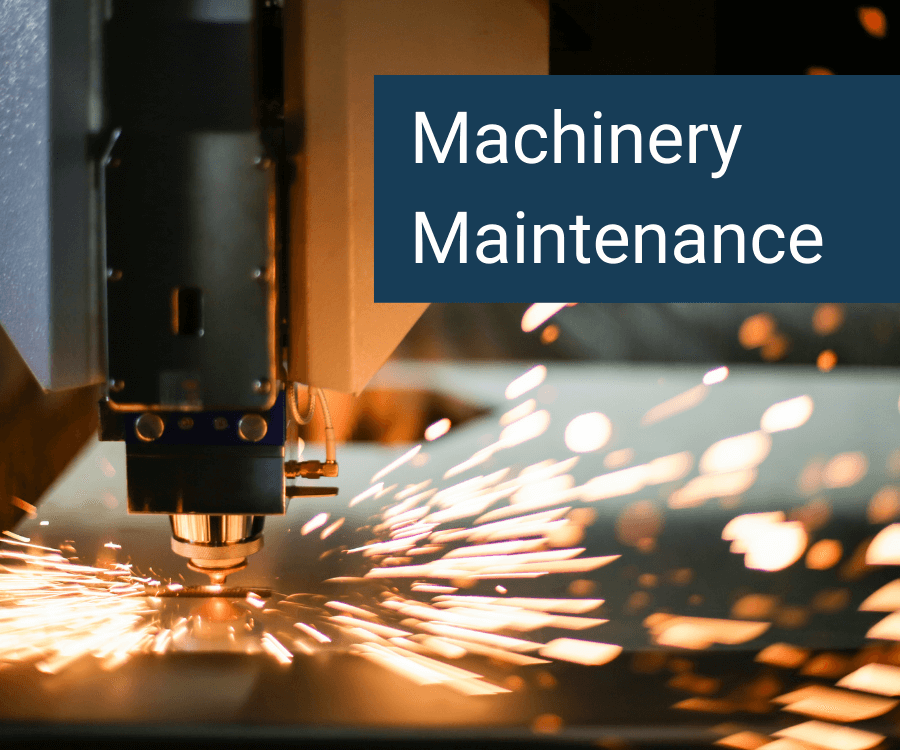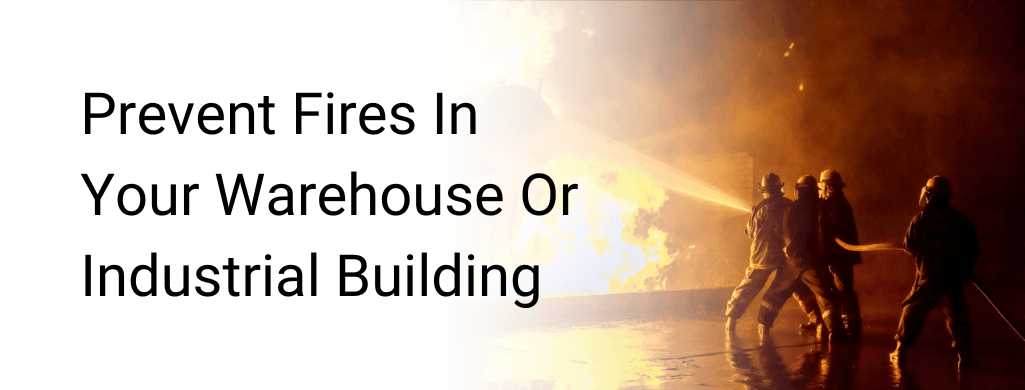Warehouse fires are more common than they should be. We want to help you take measures to protect your warehouse and your employees and effectively prevent fires. Whether you have a manufacturing plant within a large warehouse or your commercial building is used for shipping and handling, there is always a fire risk.
Preventative measures and building maintenance will keep your warehouse from succumbing to fire hazards.
What Causes Fires In A Warehouse & Industrial Buildings
Before we look at how you can prevent a fire from breaking out in your commercial warehouse, let’s understand the issue at its source: the cause of explosions and fires in warehouses. There are a few common causes of warehouse fires, like dust build-up and electrical problems. There are other types of warehouse fires that are common to specific industries like food manufacturing which deals with sugar that is explosive. We will cover the general types of warehouse fires and then focus on a few specific industries.
Causes of warehouse fires:
- Combustible Dust build-up
- Electrical problems
- Human error
- Smoking
- The Kitchen/breakroom area
- Arson
If you work in manufacturing and have specific products being produced or developed, there are a lot more causes of fires. In manufacturing, you have to be even more cautious of building fires due to the materials and machinery used daily.
Causes of manufacturing plant fires:
- Explosive dust and flammable dust build-up
- Machinery failure
- Overloaded electrical equipment
- Flammable liquids
- Using flame-based tools (torches, welding. etc.)

How To Prevent A Fire In Your Industrial Building
There are obvious ways to prevent a fire, like having a fire extinguisher. These are obvious and typically required legally. We cover the following ways of avoiding a warehouse fire, but we want to focus on large-scale preventative measures to make sure all your bases are covered.
1. Keep A Clean Industrial Building To Prevent Fires
Having a clean warehouse or manufacturing plant improves your plant’s safety immensely. A clean warehouse has less to catch fire and is much safer for your employees.
2. HVAC Cleaning & Maintenance Stops Fire Hazards
Many manufacturing plant owners overlook the HVAC system. On top of your ductwork, inside your ductwork, and within your entire HVAC system, explosive dust can build up. This is why you should have your HVAC video inspected, your ductwork cleaned and your HVAC system regularly maintained.
3. Regular Electrical Maintenance

Just like your HVAC system, your electrical system can also accumulate explosive dirt and dust or flammable liquids that one simple spark can ignite at a moment’s notice. Annual, quarterly, or monthly inspections can save your business from a significant financial loss in a fire.
4. Regular Machinery Maintenance & Cleaning
Depending on your industry, the machinery that is used has a lot of moving parts. Whether there are electrical components or there are gears that are constantly rubbing together, there is a probable chance of a spark. Make sure there isn’t any material build-up that can ignite and start a fire in your warehouse.
5. Storing Flammable Materials Correctly
If you transport or work with flammable liquids, make sure they are stored effectively. For example, if you have a propane-powered forklift, make sure your operators are knowledgeable about keeping the fuel sealed and secure. Operator errors can occur rapidly and have large-scale repercussions.
6. Having Fire Extinguishers Readily Available
This is an obvious one. To prevent fires, make sure your workstations have fire extinguishers readily available. Make sure they are not expired during your quarterly safety reviews.
7. Separate Smoking Area To Prevent Building Fires
So many fires start from cigarettes. Make sure there is a designated smoking area to protect your building and employees. In this designated area, make sure a fire extinguisher is available, and there are no materials, grass, or trash nearby that can catch fire.
8. Fire Emergency Practice
Make sure that your employees are prepared for a fire. Have clear roles and expectations on fire escapes as well as where fire extinguishers are located. Make sure it is clear what protocols should be followed in the scenario your warehouse catches fire, or a combustible explosion occurs. In these emergency situations, communication is vital. If your employees are not prepared, more damage, or worse, loss of life can occur.
9. Clearly Marked Exits For A Fire Emergency
The first thing to communicate to your employees is how to exit the building quickly in the case of a fire. During a fire, this can keep your employees from rushing to the same exit and allow everyone to vacate the building safely.
10. Sprinkler System Stop Warehouse Fires
In larger warehouse buildings, sprinkler systems are required. This is because they are an effective way to stop a fire in its tracks. Make sure your sprinkler system is up to date and operational in your warehouse, that way you may prevent fires from occurring.
11. Follow OSHA & NFPA Fire Safety Guidelines
OSHA and the NFPA have rules and regulations designed to protect your business and employees from fire hazards. Make sure you follow these fire safety guidelines in your warehouse or industrial building, because your business could be held liable or viewed as negligent. This would result in fines, lawsuits, and a lack of insurance coverage.
12. Building Security To Stop Arson
Depending on where you are located, there is always a chance of arson. Having building security will help protect your commercial building from arson. Whether it be a disgruntled past employee or a repeat arson offender, arson can happen to your industrial building.
13. Perform Regularly Scheduled Fire Safety Inspections
Fire hazards do not just appear. They develop over months of neglect, dust build-up or accidental wear and tear on a circuit breaker or piece of machinery.
14. Ask Your Employees About Fire Hazards
Your employees are in their workspace every day. They see when potential hazards appear, but more often than not, they do not feel they are qualified or have the voice to speak up about the fire hazard. They may think, “not my problem”. By requesting their help and encouraging them to notify HR or their supervisor about any fire hazards that might exist in your industrial building, then you can prevent fire hazards from cropping up.
Contact PROAC For Building Maintenance To Prevent A Fire
PROAC performs cleaning and preventative maintenance for commercial buildings like warehouses and industrial buildings. Our team can provide industrial cleaning services where we remove explosive dust or material build-up that is flammable, and we are experienced with a variety of industrial HVAC systems. Contact PROAC to get preventative fire maintenance for your commercial building.

